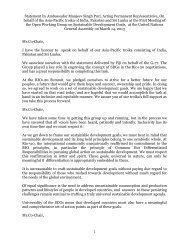STATE OF THE WORLD'S CITIES 2012/2013 Prosperity
STATE OF THE WORLD'S CITIES 2012/2013 Prosperity
STATE OF THE WORLD'S CITIES 2012/2013 Prosperity
Create successful ePaper yourself
Turn your PDF publications into a flip-book with our unique Google optimized e-Paper software.
providing adequate infrastructure and urban services,<br />
improving the quality of life, making society more equitable,<br />
and ensuring environment sustainability.<br />
Of course, there are instances where non-democratic<br />
leadership is associated with a degree of economic<br />
prosperity, but this is the exception rather than the rule.<br />
Indeed, non-democratic regimes are coterminous with<br />
pathologies such as predation and expropriation, and in<br />
the long-run undermine the institutions underlying that<br />
prosperity. 18 It has been noted that autocratic governments<br />
often distribute benefits to an elite group, while democratic<br />
governments distribute benefits more widely to gain the<br />
support of the general public. 19<br />
Favourable business environment<br />
A business-conducive environment is needed for a vibrant<br />
private sector, attracting and retaining investment (including<br />
foreign direct), creating jobs and improving productivity –<br />
all of which are important for the promotion of growth and<br />
for expanded opportunities for the poor. 20<br />
Cities such as Singapore, Hong Kong, Seoul, Busan,<br />
Kuala Lumpur, Tokyo, Yokohama and Osaka all feature<br />
favourable business environments, with beneficial effects on<br />
prosperity. In Africa, it is easier to do business in St Louis<br />
(Mauritius), Johannesburg, Kigali, Tunis and Gaborone<br />
than in Kinshasa, Conakry, Asmara, N’Djamena or Bangui,<br />
which are located in countries that rank low in business<br />
environment. Generally, cities in the former group of<br />
countries tend to be more prosperous than those in the latter.<br />
Rwanda has consciously deployed a business-friendly<br />
environment, in the process bringing a higher degree of<br />
prosperity to its capital, Kigali. In recent years, Rwanda<br />
has undertaken reforms to streamline business procedures,<br />
create a favourable legal framework, reduce bureaucracy,<br />
and improve service delivery in order to promote both<br />
domestic and foreign investment. For instance, in Kigali,<br />
registering a business takes only three days and costs less<br />
than five per cent of the average income in an environment<br />
devoid of corruption, making the city “a very easy place for<br />
a global firm to operate”. 21<br />
Access to basic amenities<br />
An efficient mass transit system is essential for the seamless<br />
movement of people and goods within and between cities,<br />
which in turn is vital for the prosperity of cities. In Lagos,<br />
the bus rapid transport (BRT) system has attracted new<br />
patronage, lowered average fares, creating 1,000 jobs as<br />
well as indirect employment for over 500,000 people. 22<br />
97<br />
FACT<br />
POLICy<br />
From Comparative Advantage to Urban <strong>Prosperity</strong><br />
A system that ensures that local officials are elected<br />
is ranked by local experts as the fifth most important<br />
policy-related factor that enhances urban prosperity. The election<br />
of local or city officials presupposes the existence of stable<br />
democracy through which citizens are empowered to elect and<br />
remove their leaders through an open, free and fair ballot.<br />
Political institutions like democracy are essential<br />
if the conditions for prosperity are to be laid out<br />
and nurtured.<br />
FACT<br />
Across the four developing regions surveyed by UN-<br />
Habitat, a favourable business environment is perceived<br />
to be most important in Asia – possibly pinpointing the role played<br />
by cities in the region, creating an enabling environment for<br />
businesses and attracting foreign direct investment.<br />
FACT<br />
In South Africa, the<br />
Gautrain is expected<br />
to reduce road traffic<br />
between Johannesburg<br />
and Pretoria by 25,000-<br />
30,000 cars per day; this is<br />
one of the busiest roads in<br />
South Africa where traffic<br />
increases an average seven<br />
per cent every year. 23 In<br />
Bogotá, the BRT provides<br />
fast and reliable transport<br />
for over 1.4 million<br />
passengers per day, in the<br />
process reducing traffic<br />
congestion and enhancing<br />
environmental quality. 24<br />
Access to basic<br />
amenities and<br />
infrastructure, including<br />
improved public transport<br />
and ICT, is a factor that<br />
will enhance the prosperity<br />
of any city. This factor<br />
is considered as most<br />
important in African and<br />
Asian cities.<br />
Cities with a<br />
POLICy favourable<br />
business environment and<br />
entrepreneurial culture<br />
are more likely to be<br />
prosperous.<br />
In addition to the<br />
foregoing, access to basic<br />
amenities can deliver major<br />
prosperity-enhancing benefits such as: supporting economic<br />
growth; contributing to achievement of Millennium<br />
Development Goals through improved health and education;<br />
improving quality of life especially for youth and women;<br />
enhancing environmental quality through improved access<br />
to water and sanitation, which in turn reduces morbidity and<br />
mortality, and fosters greater productivity.



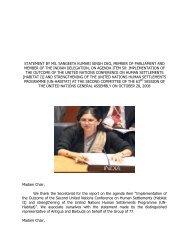
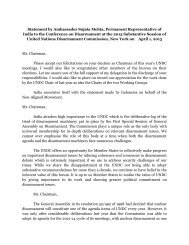
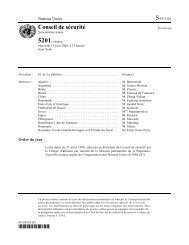
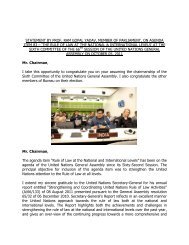
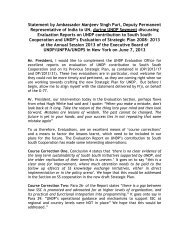
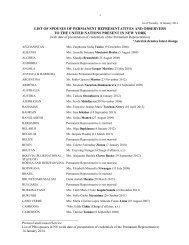
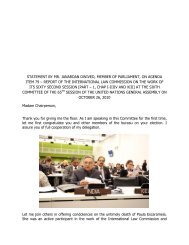
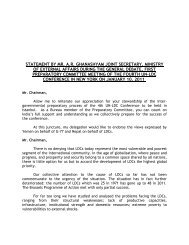
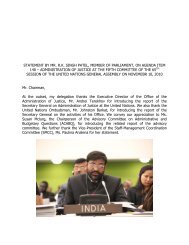
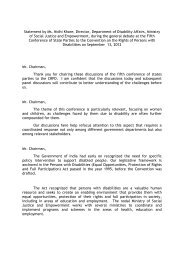
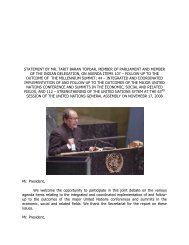
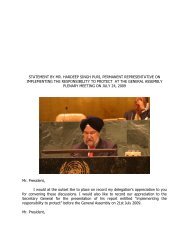
![1 statement by dr.[mrs] kakoli ghosh dastidar - Member States Portal](https://img.yumpu.com/27526598/1/190x245/1-statement-by-drmrs-kakoli-ghosh-dastidar-member-states-portal.jpg?quality=85)
